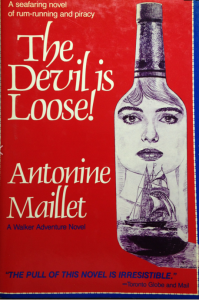Always Something New to Learn about Canada, like the Acadian Dialect Chiac, Vernacular for Author Antonine Maillet
/1 Comment/in Canadian Books & Authors, Music, Bands & Radio, News, Politics, History & Media/by Philip TurnerI recently heard a fascinating radio episode on the public radio program The World about a dialect of French heard nowadays exclusively in the regions of Canada where people of Acadian descent live today, Nova Scotia (NS) and New Brunswick (NB). It’s called Chiac, a name derived from a nearby town, Shediac, NB, that calls itself “Lobster Capitol of the World.” The program had run a shorter version of this half-hour podcast on WNYC, and I’m listening to the full version while writing this post. I was particularly excited when at the end of the radio bit they played a song by the incomparable Lisa Leblanc, who I heard live and loved at the CMJ festival in 2014, shown here. 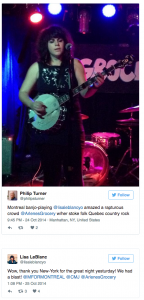 As readers of this blog may recall, I’ve traveled a lot in Atlantic Canada, including through Acadian locales, including the scenic island of Cape Breton, NS, where I learned about the mass expulsion of 1755-1764 which the British Navy forced on French-speaking people who’d settled in the region. I’d never known the local dialect had a name.
As readers of this blog may recall, I’ve traveled a lot in Atlantic Canada, including through Acadian locales, including the scenic island of Cape Breton, NS, where I learned about the mass expulsion of 1755-1764 which the British Navy forced on French-speaking people who’d settled in the region. I’d never known the local dialect had a name.
Relatedly, as editor at Walker & Co in 1987, I published the US edition of a novel by one of New Brunswick’s most honored writers, Antonine Maillet (b. 1929) of Bouctouche, NB, a town just north of Shediac facing the Gulf of St Lawrence across from the southern shores of Prince Edward Island. The book had come out in Canada a few years earlier, and I acquired US rights from a doyenne of Canadian publishing, Louise Dennys, for many years with Random House and Knopf Canada who was then part of her own company, Lester & Orpen Dennys. Maillet’s book was a fantastical historical novel, featuring a female pirate named Crache à Pic (translates as ‘spit-in-your-eye), skipper of a ship called Sea-Cow. who while Prohibition prevails in the States is running whiskey to American smugglers’ boats in the north Atlantic. My flap copy read, “Immediately reminiscent of Compton Mackenzie’s Whisky Galore and Howard Frank Mosher’s Disappearances, the Walker Adventure Series is pleased to publish The Devil is Loose! and Antonine Maillet, a storyteller of international reputation.”
Mackenzie’s 1947 novel was set during WWII, when a whisky-laden ship runs aground near the aptly-named Great Todday and Little Todday, Scottish islands whose ration of spirits has run out, leaving locals high and dry, who must decide what to do with the contraband; it was adapted for the funny movie, Tight Little Island. Mosher’s Disappearances is a multi-generational romp featuring a family who sometimes go by the surname Goodman, and sometimes Bonhomme. They live in the mythical Northeast Kingdom, Vermont’s northernmost region, and run liquor across the very real Lake Memphremagog, a long body of fresh water that straddles the border with Canada. I used to quote the opening paragraph for customers who I thought would enjoy the novel. Mosher has since written many novels set in Kingdom County.
Maillet was by 1987 already the author of more than 25 novels and plays, rich work that draws on a centuries-long store of folklore and local knowledge, about which she’s a scholar. In ’87, she traveled to NYC from Montreal, where she divides time with Bouctouche, and gave a talk at the Americas Society on Park Ave. Her tour in the US was subsidized by the cultural ministry of Quebec. I’ll add, from the year I entered publishing as an editor, in 1986, Canadian authors I published in the US, including Lt Romeo Dallaire and Margaret Atwood, often received significant support from federal and provincial agencies, eager to promote Canadian writers, including authors freshly launched in their careers, like Steven Galloway, whose first adult novel Ascension I brought in 2002. This held true until a few years in to the reign of PM Stephen Harper, whose government shut off the funds for cultural exchange to the US. I’m hopeful the cultural outreach will be restored and reinvigorated under PM Justin Trudeau.
Maillet is a mighty woman of rather short stature, and quite striking in appearance. We found that the lectern reserved for her was too tall, and unaccountably the venue had no stool or riser for her to stand on. Fortunately, I found a big box holding many reams of photocopy paper and at this ultra white-shoe venue she stood atop it to read from her novel, and lecture in a forceful, accented English about the French vernacular in which she wrote the book, and much of her work. Though I don’t think she called it Chiac, she described the local tongue, and its grounding in the French spoken by arrivals in the new world beginning in the 16th century. She likened it to speaking the French of Rabelais, who I note died in 1555! She described the settlers’ remoteness from French in Europe, as France advanced in to the industrial revolution, an isolation that set the local language, as if trapped in amber. Maillet has also created theater characters like La Sagouine, a wise old woman who tells audiences stories and imparts lore, using the local vernacular. I feel like the live theatre piece must form the heart of Chiac. Maillet’s accomplishments are truly a marvel to be celebrated. I first learned of her when as a bookseller with Undercover Books in Cleveland, when in 1979, with an earlier novel—Pélagie-la-Charrette, or Return to the Homeland, an epic account of the Acadian expulsion, a diaspora that scattered them to other parts of North America, including Louisiana, where the Acadiennes, become Cajuns—she became the only North American writer, male or female, to win France’s most prestigious book prize, the Prix Goncourt.
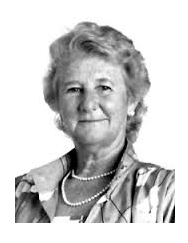 I was aware that people of Acadian descent still maintain a kind of linguistic flavor now rare in the modern world, but was delighted to learn so much more about it in this excellent half-hour of radio. I love language stuff like this, all the better when it’s about one of my favorite countries, and one of my favorite regions in that country! Below is some detail from the podcast’s web page, which you can listen to in full here.
I was aware that people of Acadian descent still maintain a kind of linguistic flavor now rare in the modern world, but was delighted to learn so much more about it in this excellent half-hour of radio. I love language stuff like this, all the better when it’s about one of my favorite countries, and one of my favorite regions in that country! Below is some detail from the podcast’s web page, which you can listen to in full here.
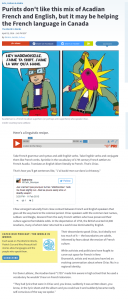
Mr Trudeau Comes to Washington
/0 Comments/in News, Politics, History & Media/by Philip Turner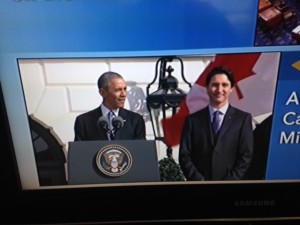 Joyous arrival ceremony at the White House welcoming Canadian PM #JustinTrudeau and the entire Canadian delegation. Later, in DC this morning, Michele Obama and Sophie Gregoire Trudeau spoke at an event promoting girls’ education around the world. #LetGirlsLearn. This is going to be a great opportunity for American and Canadians to renew our national bonds with values of tolerance, caring for the planet, education, and much more.
Joyous arrival ceremony at the White House welcoming Canadian PM #JustinTrudeau and the entire Canadian delegation. Later, in DC this morning, Michele Obama and Sophie Gregoire Trudeau spoke at an event promoting girls’ education around the world. #LetGirlsLearn. This is going to be a great opportunity for American and Canadians to renew our national bonds with values of tolerance, caring for the planet, education, and much more.
Justin Trudeau Was Great on 60 Minutes, While CBS Correspondent Lara Logan was Terrible
/0 Comments/in Media, News, Politics, History & Media/by Philip Turner I was eager to watch Justin Trudeau on 60 Minutes Sunday night, and indeed he handled himself very well, but I gotta say I disliked the attitude adopted by interviewer Lara Logan, which had a noticeable American rightwing edge to it with tendentious questions about the 25,000 Syrian refugees Canadians have admitted to their country since last December, and about ISIS. Prime Minister’s Trudeau’s executed a rapid turnaround in Canada’s international reputation, and is showing Canada and the world how to lead one’s country in a new direction, cultivating core social values, all with welcoming inclusion.
I was eager to watch Justin Trudeau on 60 Minutes Sunday night, and indeed he handled himself very well, but I gotta say I disliked the attitude adopted by interviewer Lara Logan, which had a noticeable American rightwing edge to it with tendentious questions about the 25,000 Syrian refugees Canadians have admitted to their country since last December, and about ISIS. Prime Minister’s Trudeau’s executed a rapid turnaround in Canada’s international reputation, and is showing Canada and the world how to lead one’s country in a new direction, cultivating core social values, all with welcoming inclusion.
Here's the picture @60Minutes showed of Pierre and Maggie Trudeau. Yes, that's @KimCattrall. pic.twitter.com/T8NQzYsoYW
— Toronto Mike (@torontomike) March 7, 2016
Update: During the CBS broadcast, I heard Lara Logan refer to Margaret Trudeau, Justin Trudeau’s mother, and they showed a picture of a young woman with Pierre Elliott Trudeau. The only problem with this? Turns out, they had shown a picture of a different woman (Kim Cattrall, then a young actress). This reminded me that Logan has long been prone to making serious errors as a correspondent for 60 Minutes, like she did in 2013 when she promoted a faux memoir of a security operative who claimed, falsely, he had been in Benghazi when the US embassy there was attacked in 2012. I wrote about this at the time on my other blog, The Great Gray Bridge.
60 minutes just showed a picture of Kim Cattrall as Maggie Trudeau… erm, didn't anyone proof this? #Trudeau #60Minutes
— Hillary Ryde-Collins (@HillaryRyde) March 7, 2016
All the Ways Justin Trudeau’s making Canada Canada again, Contrasted with the Trump Platform
/0 Comments/in News, Politics, History & Media/by Philip TurnerSince Canadian PM Justin Trudeau took office a few months ago I've been cheering his work at bringing his country back…
Posted by Philip Turner on Tuesday, 1 March 2016
What a Way to Start a Life Together!
/0 Comments/in News, Politics, History & Media/by Philip Turner What a way to launch their life together—a Toronto couple canceled their swank wedding reception, got married at City Hall, then donated the money saved to sponsor a Syrian #refugee family of four, while encouraging friends and family to donate, too. Most of their goal has been met, and now, it being so public, I’m sure they’ll go way over the top. A true feel-good story on the CBC website.
What a way to launch their life together—a Toronto couple canceled their swank wedding reception, got married at City Hall, then donated the money saved to sponsor a Syrian #refugee family of four, while encouraging friends and family to donate, too. Most of their goal has been met, and now, it being so public, I’m sure they’ll go way over the top. A true feel-good story on the CBC website.
This story is meaningful to me for many reasons, even beyond the generosity the happy and handsome couple have shown to people in need, and the example they’ve set for the rest of us. In 1991, when my wife-to-be and I were deciding how we’d be married, we had some money provided to us by our families, and instead of holding a big reception we used it to travel in Italy for six weeks, a honeymoon for the ages. We backpacked and took trains up and down the country, from Bergamo in the north down south to Rome, with stops along the way in Florence, Arezzo, Siena, Padua, Perugia, Verona, Venice, and places too tiny to remember. Kyle is a painter, and spending so much time seeing Renaissance art and architecture was a veritable graduate course in seeing for her, and for me, too. Here we are during that long honeymoon of ours.
1993, another Time Canada’s Conservatives Were Soundly Swept from Power
/0 Comments/in News, Politics, History & Media, Personal history, Family, Friends/by Philip TurnerWith the welcome change of power occurring tonight in Canada, I’m remembering Fall 1993, when my wife and I were in Canada on a late autumn road trip. A week in late October found us in a wee beauty spot called Margaree Harbour, on Cape Breton island, in the province of Nova Scotia. With its scenic Cabot Trail, I like to call Cape Breton the Big Sur of Canada. 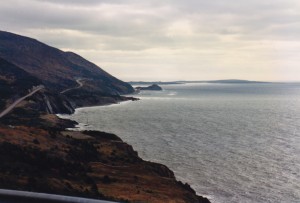
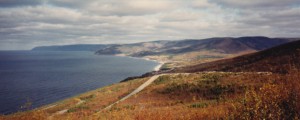
That year, October 25 happened to be the date of a Canadian federal election, and a local friend we’d made, Geoffrey May, invited us over to have dinner and watch the returns with him and his wife, Rebecca Lynne, and a friend of theirs. 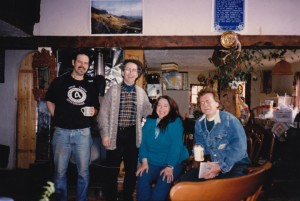 It turned out to be an amazing night, as in this election Progressive Conservative party members in the federal parliament were swept out of power in one of the most lopsided defeats ever in the history of modern elections. Prime Minister Kim Campbell lost her office, and Liberal Party leader Jean Chretien became PM. It was a celebratory evening—for comparison’s sake, imagine all Republican officeholders in the U.S. losing on the same day!
It turned out to be an amazing night, as in this election Progressive Conservative party members in the federal parliament were swept out of power in one of the most lopsided defeats ever in the history of modern elections. Prime Minister Kim Campbell lost her office, and Liberal Party leader Jean Chretien became PM. It was a celebratory evening—for comparison’s sake, imagine all Republican officeholders in the U.S. losing on the same day!
We were renting a small vacation house that week from Geoffrey’s sister, Elizabeth May, then the head of Sierra Club in Canada. Ms May, of course, has since become a prominent Canadian politician, leader of Canada’s Green Party, first Green Party member of the Canadian Parliament. I’ve written more about that special vacation, including about Geoffrey and Elizabeth’s fascinating parents (the Mays were all friendly with Farley Mowat), and that year’s World Series, when the Bluejays last won it all, all assembled at the post, Why I Write this Blog.
Rallying Against Stephen Harper with Canadians in Brooklyn
/0 Comments/in News, Politics, History & Media, Urban Life/by Philip Turner I was glad I could offer my personal support to Canadian expatriots in the NY area who rallied last night to mobilize voters back home to help vote the Stephen Harper government out of power in the federal election next Monday, October 19. Among the musical guests that played were Slow Down, Molasses, a rockin’ band from Sasketchewan. I chatted with Levi, one of the 5-piece band’s guitarists, and his friend, Amanda. Gillian Frank—an expat who’s filed suit against the current government’s restrictions on the voting rights of Canadians living abroad, contrary to provisions of the Charter of Rights and Freedoms—was also in the house and gave a rousing talk. Frank’s website is LetCanadiansVote.com.
I was glad I could offer my personal support to Canadian expatriots in the NY area who rallied last night to mobilize voters back home to help vote the Stephen Harper government out of power in the federal election next Monday, October 19. Among the musical guests that played were Slow Down, Molasses, a rockin’ band from Sasketchewan. I chatted with Levi, one of the 5-piece band’s guitarists, and his friend, Amanda. Gillian Frank—an expat who’s filed suit against the current government’s restrictions on the voting rights of Canadians living abroad, contrary to provisions of the Charter of Rights and Freedoms—was also in the house and gave a rousing talk. Frank’s website is LetCanadiansVote.com.
I was also pleased to see that a number of journalists—both independent correspondents and representatives of traditional media, like the Guardian, which ran this video report today—came out to cover the event. Among the latter group was CBC’s correspondent in New York, Steven D’Souza, who I saw holding a mic emblazoned with the CBC logo on it while he conducted an interview with a woman who spoke about how Canada’s reputation abroad, always stellar when she travels, has suffered around the world. As he asked her questions, I recognized his voice from listening to CBC radio. He interviewed me, too, asking why an American had come to this event. I explained about my lifelong affinity for Canada, and my bi-national bent, in which I’ve long been interested in politics, culture, and media in Canada and the US. I added that the longer Harper’s been in power, the more I’ve been reminded of the George W. Bush presidency, a disastrous siege from which the US is still recovering. I’ll add here what I wish I’d also said: the CBC is an essential national service and I hope with great fervency that the next Canadian government will fully restore funding and support for the future of the national broadcaster. No more #CBCCuts, please.
The venue in Brooklyn was intriguing, a former car wash called Williamsburg Hand & Detail that’s recently been converted to a music venue. I had a chat with “Donovan,” one of the proprietors of the new venue. There was indoor space, where the bands played, and outdoor space, where spontaneous art-making was encouraged, including a big photograph of Stephen Harper on which people were drawing new facial features and pungent messages. Wearing a PEI ball-cap obtained during a vacation to Canada’s smallest province some years ago, and a CBC Radio 3 t-shirt under my jacket, I met lots of interesting people, with whom I discussed politics, music, baseball, and books. Here are more pictures from the event.

